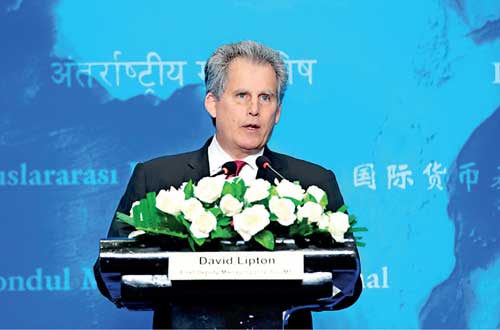Sunday Feb 22, 2026
Sunday Feb 22, 2026
Wednesday, 15 June 2016 00:00 - - {{hitsCtrl.values.hits}}
BEIJING (Reuters): China needs to implement reforms with more urgency as the economy faces growing vulnerabilities and there are fewer buffers to deal with any shocks, an International Monetary Fund (IMF) official said on Tuesday.
“The near-term growth outlook has turned more buoyant due to recent policy support,” David Lipton said, according to a copy of his prepared remarks provided to Reuters.
“The medium-term outlook, however, is more uncertain due to rapidly rising credit, structural excess capacity, and the increasingly large, opaque, and interconnected financial sector,” Lipton, first deputy managing director of the IMF, said at the end of a visit to Beijing.
China’s economy grew at its slowest pace in a quarter of a century last year, weighed down by weak demand at home and abroad, cooling investment and overcapacity, particularly in industries such as steel and coal.
Analysts say continued government efforts to stimulate activity and hit growth targets are driving up debt levels, raising concerns about dangers to the country’s banking system, which has seen non-performing loans hit 11-year highs.
“Corporate debt, though still manageable, is high and rising fast,” Lipton said, adding that China needed a comprehensive plan and concrete action - especially for state-owned enterprises - to avoid serious problems down the road.
The IMF expects China’s economy to grow by around 6% 2017. Beijing has set a goal of at least 6.5% growth over the next five years, though some analysts believe real growth levels are already much weaker than official data suggest.
China also needs to align local government revenue and expenditure responsibilities, expand social security, implement new budget laws and make the tax system more progressive, Lipton said.
The IMF suggested implementing a carbon or coal tax, which would significantly reduce China’s serious air pollution problem and could prevent 4-5 million premature deaths in 2030.
In addition to fiscal reform, Lipton said China needs to guard against growing risks in its increasingly complex financial system by increasing coordination between different regulators and markets and strengthening funding resilience for both banks and other financial institutions.
Turning to China’s foreign exchange policy, which is high on global investors’ worry lists after a surprise yuan devaluation last year, Lipton said the exchange rate is becoming “more flexible and market-based”. The IMF encouraged China to set “a goal of achieving an effective float within the next couple of years.” Lipton also noted China had improved its data and communication of policies to markets and the public, and said further improvement would help China with its economic transition.